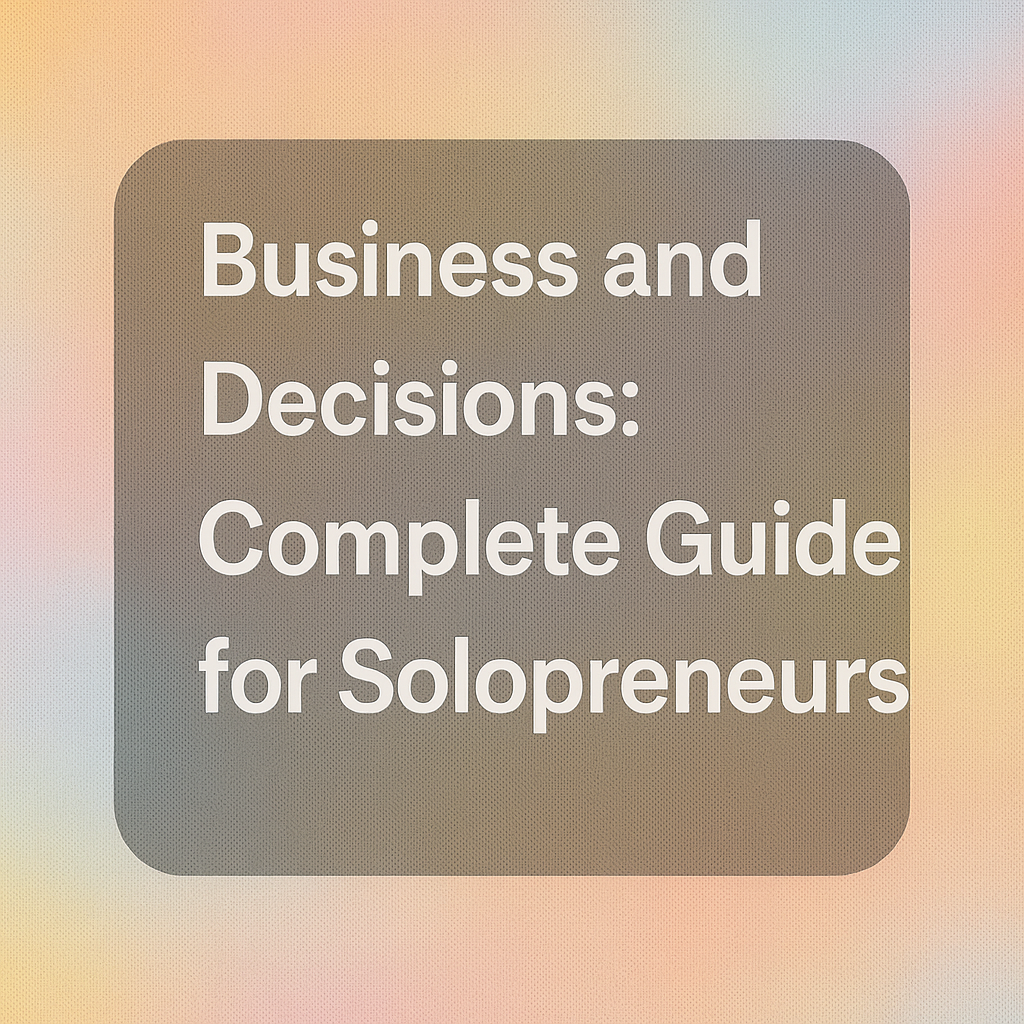
Did you know that over a third of solopreneurs cite decision fatigue as their top barrier to growth? Every choice between business and decisions, from setting prices to choosing clients, can shape the future of a solo business. The decisions you make are more than routine tasks—they are key turning points that affect your reputation, income, and long-term resilience. Understanding the meaning and impact of business and strategic decisions helps you turn day-to-day challenges into real opportunities for success.
Table of Contents
- Defining Business and Strategic Decisions
- Types of Decisions Solopreneurs Face
- Essential Steps in Business Decision-Making
- Tools and Technologies for Smarter Choices
- Common Decision-Making Mistakes to Avoid
Key Takeaways
| Decision Point | Details |
|---|---|
| Importance of Strategic Decisions | Strategic decisions are crucial for shaping business direction and achieving long-term success, particularly for solopreneurs who must rely on their insights and experiences. |
| Types of Decisions | Solopreneurs face structured, unstructured, and strategic decisions, each requiring different approaches and skills for effective management. |
| Decision-Making Framework | A structured yet flexible framework, focusing on clear goal-setting and risk assessment, is essential for navigating complex decisions effectively. |
| Common Mistakes | Avoiding overcommitment, failing to set clear priorities, and managing decision fatigue are pivotal for maintaining effective decision-making processes. |
Defining Business and Strategic Decisions
Businesses don’t just happen. They emerge from deliberate choices, managing business and decisions, strategic thinking, and calculated risks. Strategic decisions represent the critical choices that shape an organization’s trajectory, determining its direction, competitive positioning, and long-term success. According to en.wikipedia.org, behavioral strategy reveals how psychological insights profoundly influence strategic management, highlighting the critical role cognitive processes play in decision-making.
At its core, a business decision transforms abstract possibilities into concrete actions. These decisions range from fundamental choices like market entry and product development to nuanced judgments about resource allocation, partnership formation, and organizational structure. Arxiv.org emphasizes that recognizing business opportunities represents the foundational first stage of entrepreneurial processes, underscoring how individual knowledge and social networks critically impact opportunity identification.
For solopreneurs, strategic decision-making becomes even more personal and consequential. Unlike large corporations with extensive resources and multiple perspectives, independent professionals must rely on their own insights, experiences, and analytical capabilities. Key strategic decisions typically involve:
- Market positioning and target audience selection
- Pricing and service delivery models
- Personal skill development and specialization
- Technology and tool investments
- Client acquisition and relationship management strategies
Successful solopreneurs understand that strategic decisions are not one-time events but ongoing processes of evaluation, adaptation, and refinement. They recognize that each choice creates a ripple effect, potentially transforming their business’s entire landscape.

The most effective decision-makers combine analytical thinking with intuitive understanding, continuously learning from both successes and setbacks.
Ultimately, strategic decision-making is about transforming potential into performance. It requires solopreneurs to balance calculated risk-taking with a deep understanding of their unique capabilities and market dynamics. For those willing to approach decisions thoughtfully and strategically, the entrepreneurial journey becomes not just a professional path, but a continuous opportunity for growth and innovation.
Types of Decisions Solopreneurs Face
In the dynamic world of solopreneurship, decision-making is both an art and a science. Faraqnabelvadyka.blog.unesa.ac.id highlights three fundamental types of decisions that solopreneurs navigate: structured decisions (routine tasks with clear procedures), unstructured decisions (complex situations requiring creativity), and strategic decisions (long-term, high-impact choices) that define business trajectory.
Here’s a comparison of the three main types of decisions solopreneurs face:

| Decision Type | Characteristics | Typical Examples |
|---|---|---|
| Structured | Routine Clear procedures | Accounting setup Client onboarding |
| Unstructured | Complex Requires creativity | New product ideas Responding to crises |
| Strategic | Long-term High impact | Market selection Pricing strategy |
The complexity of decision-making for independent professionals cannot be overstated. According to Rameshdontha.com, solopreneurs frequently confront decisions related to:
- Uncertainty management
- Risk assessment
- Business planning
- Business sustainability
- Time management
- Resource allocation
These decisions are not merely administrative tasks but critical pivot points that can dramatically influence business success. Consider the structured decisions like setting up accounting systems or defining client onboarding processes. These are foundational, repeatable actions that create operational consistency. Unstructured decisions, conversely, require innovative thinking precise responses to unique challenges.
Strategic decisions represent the most consequential choices. They involve selecting target markets, determining service offerings, setting pricing strategies, and deciding on technological investments. Complete Guide To Business Decision-Making Success can provide deeper insights into navigating these complex choices. Successful solopreneurs develop a nuanced approach that balances analytical thinking with intuitive understanding, recognizing that each decision shapes their professional journey.
Ultimately, effective decision-making for solopreneurs is about building resilience, maintaining flexibility, and continuously learning.
It demands a holistic perspective that considers not just immediate outcomes, but long-term professional growth and personal satisfaction. By developing strong decision-making skills, solopreneurs transform challenges into opportunities, turning potential obstacles into strategic advantages.
Essential Steps in Business Decision-Making
Mastering business decision-making is a critical skill for solopreneurs that transforms potential challenges into strategic opportunities. Medium.com highlights that effective decision-making fundamentally involves setting clear goals, meticulously evaluating options, carefully considering potential risks, and implementing choices that align precisely with business objectives.
The decision-making process for solopreneurs requires a structured yet flexible approach. According to Entrepreneur.com, enhancing decision-making capabilities involves implementing smart systems such as:
- Strategic outsourcing
- Building professional networks
- Creating financial buffers
- Developing structured time management techniques
Effective decision-making begins with goal clarity. This means defining specific, measurable outcomes that transform abstract aspirations into concrete targets. Solopreneurs must ask themselves critical questions: What exactly do I want to achieve? What metrics will demonstrate success? How will this decision impact my long-term business strategy?
Risk assessment forms another crucial component of the decision-making framework. Understanding Making Business Decisions For Professionals can provide additional insights into navigating complex choices. Successful solopreneurs learn to balance potential rewards against possible setbacks, developing a nuanced approach that embraces calculated risks while maintaining strategic prudence.
Ultimately, decision-making is an iterative process of learning and adaptation. The most successful solopreneurs view each decision not as a final verdict, but as part of an ongoing journey of business evolution. By cultivating adaptability, maintaining a growth mindset, and continuously refining their decision-making skills, independent professionals can transform challenges into stepping stones of professional growth and innovation.
Tools and Technologies for Smarter Choices
Slyacademy.com reveals that digital technology has revolutionized solopreneurship, enabling professionals to manage entire business operations remotely through advanced cloud-based software, social media platforms, and e-commerce solutions. The modern solopreneur is no longer constrained by traditional business limitations, but empowered by technological innovations that streamline complex processes.
According to Bizstack.tech, solopreneurs can leverage specialized tools across multiple business domains:
- Accounting Software: For precise financial management
- Project Management Applications: To organize tasks and track progress
- Communication Platforms: For seamless client interactions
- Collaboration Tools: To facilitate remote work and networking
Technology selection requires strategic thinking. Solopreneurs must evaluate tools not just for their immediate functionality, but for their potential to scale, integrate with existing systems, and provide actionable insights. What is The Best Tools for Solopreneurs can offer additional guidance on making these critical technological choices.
Beyond individual tools, the real power lies in creating an interconnected technological ecosystem. Successful solopreneurs develop a tech stack that communicates seamlessly, automates repetitive tasks, and provides comprehensive business intelligence. By thoughtfully selecting and integrating technologies, independent professionals can transform potential complexity into streamlined, efficient operations that support sustainable business growth.
Ultimately, technology is not just about having the right tools, but about developing the digital literacy to use them strategically. The most effective solopreneurs view technology as a dynamic partner, continuously learning, adapting, and finding innovative ways to leverage digital solutions for competitive advantage.
Common Decision-Making Mistakes to Avoid
In the complex world of solopreneurship, decision-making can quickly become a minefield of potential missteps. Medium.com highlights three critical mistakes that can derail independent professionals: overcommitting, failing to set clear priorities, and neglecting to say no to non-essential tasks. These pitfalls transform decision-making from a strategic process into an exhausting cycle of reactive choices.
Rameshdontha.com reveals additional challenges that solopreneurs frequently encounter in their decision-making journey:
- Ineffective risk management
- Constant second-guessing of decisions
- Lack of objective external feedback
- Emotional rather than rational decision-making
- Avoiding difficult choices
One of the most insidious mistakes is decision fatigue. Solopreneurs often spread themselves too thin, attempting to handle every aspect of their business simultaneously. This approach leads to diminished cognitive capacity, where each subsequent decision becomes progressively more challenging and potentially less sound. Understanding Making Business Decisions For Professionals offers deeper insights into navigating these complex decision-making landscapes.
Successful solopreneurs learn to create robust decision-making frameworks that minimize these common pitfalls. This means establishing clear priorities, setting boundaries, developing systematic approaches to evaluate opportunities, and cultivating the courage to make decisive choices. The key is not to eliminate mistakes entirely, but to create a learning environment where each decision becomes an opportunity for growth and refinement.
Ultimately, mastering decision-making is about developing self-awareness, building resilience, and understanding that perfection is not the goal. The most effective solopreneurs view mistakes as valuable data points, using them to refine their approach, sharpen their intuition, and continuously evolve their strategic thinking.
Take Control of Your Solopreneur Decisions with AI Support
Navigating the complex world of solopreneurship requires clear goals, smart risk management, and efficient operations. This article lays out the challenges of making strategic and daily business decisions while avoiding burnout and decision fatigue. If you want to move confidently through these challenges, leveraging an AI-powered co-founder can make all the difference. Fluum is built specifically for solopreneurs who want to automate routine tasks, gain personalized insights, and sharpen their strategic decision-making without feeling overwhelmed.

Unlock your potential now by partnering with Fluum’s AI system that adapts to your unique business needs. Automate client outreach on Instagram, streamline communication, and manage payments seamlessly. Learn more about how you can transform your decision-making and scale your business at Fluum Pricing. Ready to make smarter business moves today? Visit Fluum Pricing to start your journey toward effortless, efficient solopreneurship.
Frequently Asked Questions
What are the key types of decisions solopreneurs face?
Solopreneurs typically navigate three main types of decisions: structured (routine tasks with clear procedures), unstructured (complex situations requiring creativity), and strategic (long-term, high-impact choices).
How can solopreneurs improve their decision-making process?
To enhance decision-making, solopreneurs should set clear goals, evaluate options meticulously, assess potential risks, and develop structured systems for planning and execution.
What common mistakes should solopreneurs avoid in decision-making?
Common mistakes include overcommitting, failing to set clear priorities, neglecting to say no to non-essential tasks, and falling into decision fatigue due to attempting to manage every aspect of their business simultaneously.
How can technology assist solopreneurs in making smarter business decisions?
Technology can streamline operations by providing tools for accounting, project management, communication, and collaboration. It enables solopreneurs to integrate systems and gain actionable insights for better decision-making.
Recommended
- Complete Guide To Business Decision-Making Success
- Understanding Making Business Decisions For Professionals
- Business Niche Explained: Strategies For Solopreneurs
- Fluum | Effective Stress Management Techniques for Busy Professionals
- Fluum | How to Onboard Clients Effectively for Lasting Success
- Fluum | Master Managing Multiple Projects for Success
- Fluum | Build Your Brand with a Branding Builder in 2025
- Fluum | 7 Customer Retention Examples to Boost Your Business



